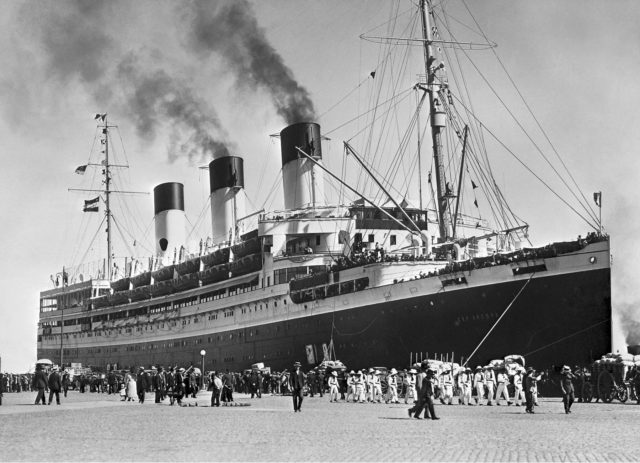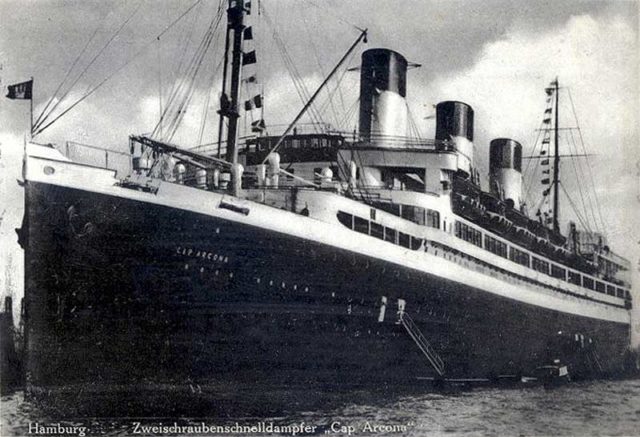Joseph Goebbels, who was a propaganda master, commissioned a film called The Nazi Titanic in 1943.
The film, which was a German wartime propaganda is about a famous sinking.
Two years later, the Titanic encountered his own fate, which claimed three times higher death toll.

Goebbels intended to show German film making as superior and also to use it as a propaganda tool that would suggest American and British capitalism as main destructive forces.
He added a fictional German officer who became a hero amongst the crew of the ship.
This character ought to have demonstrated how Germans exemplified bravery and independence in comparison to the British officers in the ship.
During the film’s production, the director, Herbert Selpin, spoke out against the Nazi regime.
He was arrested and later hanged in prison. Werner Klinger, who was not credited, finished the film.
Staring in early November 1943, the film was briefly shown in parts of Europe occupied by Germans.
Goebbels banned screenings of the film in Germany because he feared it might weaken the morale of the citizens.
Later, he prohibited any screening of the film and it wasn’t given a second run.
The Nazi Titanic was the first film on this subject and was simply titled as Titanic.
It was the first film that combined subplots and fictional characters with events that traced the path towards the sinking and historic personae.
These went on amd became a tradition in the films about the Titanic.

ShadowLock reported:
“Inspired by the blatantly political overtones of American movies like Casablanca (1942), set in Nazi-occupied North Africa and rush-released to capitalize on the publicity from the Allied invasion of the area a few weeks previously. Already an advocate of using celluloid to promote the agenda of the Nazi party, when a script landed on his desk set around the sinking of the Titanic, portraying the British and Americans as evil, greedy capitalists who put profit above human life and the Germans in steerage as heroic and compassionate in the face of disaster, Goebbels decided that such a movie was what Germany needed to rally the people and promote the war effort.
In the opening scene, White Star Line President J. Bruce Ismay (E F Furbringer) is shown colluding with the board to sell their shares in the company, convinced (naturally secret and undisclosed) that the Titanic was capable of breaking the world speed record for a liner, then buying them back right before the news about the amazing feat are released to the press.
Of course, this greed leads to an inevitable encounter with an iceberg, despite the German hero, First Officer Herr Petersen (Hans Nielsen), pleading with the Captain to slow down. Further, it sets the stage for the Teutonic seafarer to rescue dozens of passengers, including a young girl who has been left to die in her cabin by her despicable British mother. Before testifying against Ismay at the end of the film, think twice as the evil capitalists place all the blame firmly on the shoulders of the deceased Captain Smith (Otto Wernicke).”
Stockholders of White Star Line are told that their stock value is dropping, so to remedy the problem, White Star Line President J. Bruce Ismay, portrayed by E.F. Furbringer, promises to make the public aware of something during the maiden voyage that will change all that.
He is the only one who know that that ship can break the speed record, which he thinks can increase the value of the stock. Ismay and the board have the intent to manipulate stock values by selling their own stock short to buy it back at a lower price right before they reveal the details about the boat’ speed to the members of the press.
On the maiden voyage of the Titanic in 1912, First Officer Peterson, who is a German portrayed by Hans Nielsen, begs the owners of the ship who are portrayed at snobbish, rich, and sleazy, to slow down the ship. After they refuse, the ship strikes an iceberg and ends up sinking.
The first class passengers react cowardly, while Peterson and Sigrid Olinsky, his impoverished ex-lover Russian aristocrat, portrayed by Sybille Schmitz, act kindly and bravely.
They were joined by several other brave and kind German passengers in the film.
Peterson works to rescue many passengers, convincing his ex-lover to escape in a lifeboat.
He even saves a young girl whose callous British mother had left her to die. In the final throes of death, Peterson leaps from the ship’s deck with a child in his arms before being pulled on the board of Sigrid’s lifeboat.
Then, the occupants are watching in horror as the Titanic sinks under the waves.
Peterson testifies against Ismay at the British inquiry regarding the disaster of the ship.

However, no charges are brought against Ismay and the deceased Capt. Smith is blamed for the accident.
There is an epilogue that says “the deaths of 1,500 people remain deprived, forever a testament of Britain’s endless quest for profit.”
The filming location was at the Polish Baltic seaport of Gdynia, renamed as “Gotenhafen”.
It was occupied by Germany at the time.
It was filmed on the board of the SS Cap Arcona, which was a passenger liner.
Shortly before WW2 ended, the ship had been sunk by the Royal Air Force on May 3rd, 1945.
The death toll of the people who died when SS Cap Arcona sank was 3 times higher than the toll in Titanic.
The Germans converted the ship into a floating bomb filled with Jewish prisoners.
We have another wacko story from our “Nazi” files: The abandoned village of Oradour-sur-Glane, where 642 villagers were massacred by a Nazi Waffen-SS company.
They did that, hoping that the British are going to destroy the ship and kill everyone on board.
